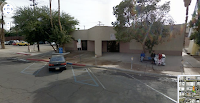Mexico - Border Spanish

¡Buenos días! ¿Cómo está usted? Bien, gracias.
Hello. How are you? Fine, thank you.
I was born in San Jose, California and grew up all over the state. I heard Spanish my whole life and my mother would often say things in Spanish to us to help us learn. I took Spanish in School and always enjoyed trying to use the language.
When I was in seventh grade, we moved to El Centro, CA which is about 12 miles north of the Mexico Border. I attended Middle School and High School there. Border Spanish can often have a mixture of Spanish and English, often called Spanglish. Two cultures and languages divided by a line still blend together creating an interesting mix. For example, saying "lonche" instead of "almuerzo" for lunch.
When I was in High School, I volunteered at the Valley Orthopedic Clinic in Calexico, right on the border. My uncle, Wayne Van De Graaff, who worked in immigration, had started the clinic after he had seen such terrible health conditions on the other side of the border in Mexicali. Club feet was a common condition there, yet rare in the US. Simple treatments or surgeries could eradicate it. He started by renting a room and involving volunteers including medical professionals to provide free services to the children of the Mexicali Valley. The small clinic grew to a full facility (see picture above). The UCLA Hospital and the Shrine's Club became supporters.
I spent many weekends volunteering by helping with the children as they saw physicians or were transported from Mexico to Los Angeles for treatments or surgeries. I loved working with those sweet young children. They spoke only Spanish, so it was a valuable experience for me to interact with them. Experiencing their humble tender hearts was the best part.
My uncle once told me about a child in Mexicali who had a terrible condition that could be treated at the UCLA Hospital. The family was living in terrible poverty with little education. He talked to the parents and told them he could have their child treated but he would have to take the child to Los Angeles. The parents were concerned but felt it was the only option and tearfully entrusted their child to my uncle. After treatment in L.A. my uncle returned the child a few weeks later. When the parents saw their child, they had tears of joy. They had not understood what he meant by Los Angeles. They thought he meant he had to take their child to los angeles (the angels). They thought their child was going to die and he was going to see the angels for help.
Learning Spanish gave me the opportunity to begin a life of service. Helping others has always been the most rewarding experience for me. Spanish is a great language to learn if you want to make a difference.
For more information on using Spanish to serve, I recommend:
Volunteer Latin America
http://www.volunteerlatinamerica.com/
Spanish Abroad
http://www.spanishabroad.com/prog_volunteer/mexico/mexico.htm
Yucatan Adventures
http://www.yucatanadventure.com.mx/volunteering-FAQ.htm
¡Gracias!
Thank you!
Donna Lansberry
www.lansberrylanguage.com



Comments
Post a Comment